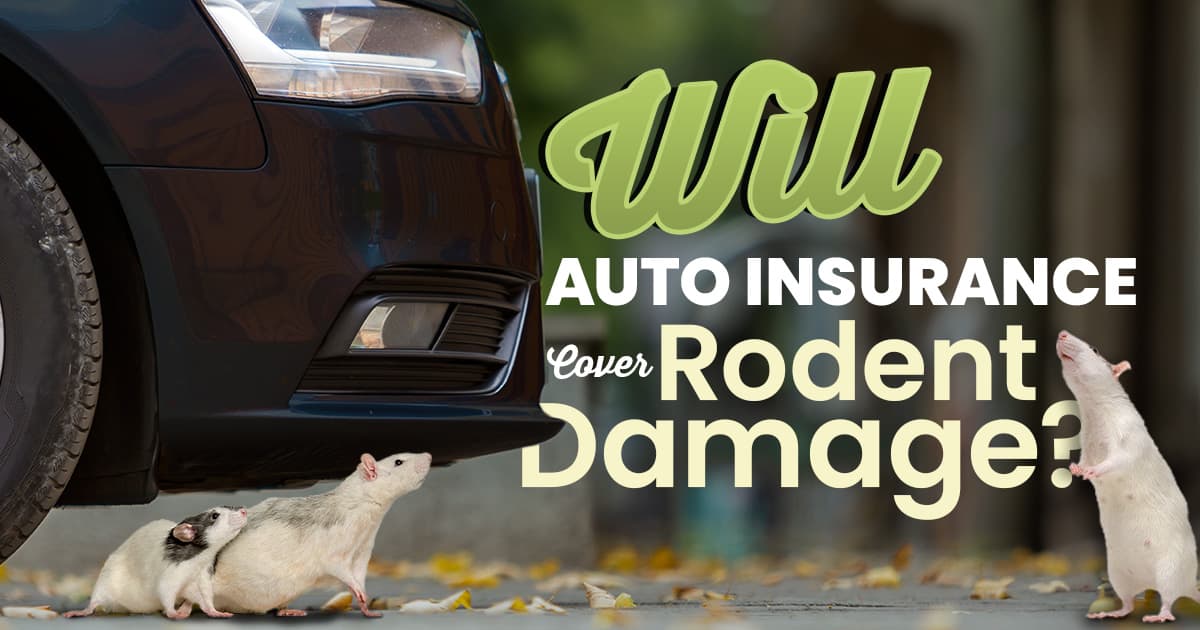
Will Auto Insurance Cover Rodent Damage?
June 30, 2024
Share:
Some people love them, some people hate them, but all can agree that finding mice and rats in places where they aren’t supposed to be is no fun. Infestations are extremely common in major Ontario cities, with the highest rodent infestations being in Toronto and some areas of Scarborough. Rodents are popular when it comes to infesting homes, but they have also been known to curl up in vehicles during the colder months – especially since engines are warm, and they’re protected from the elements.
But rodents, as small as they may be, can cause tremendous damage to our vehicles. Rodents like to chew on car, truck, and recreational vehicle wires, since these wires often resemble branches and rodents need to wear down their teeth constantly. Some wires also have soy-based casings, so they can be ingested for nutritional value. But whatever the reason, rodents chewing wires can cause tremendous damages to our vehicles. Will auto insurance cover the repair costs?
It could. Let’s get into it.
When will car insurance cover rodent damage?
You might be surprised to learn how much of an issue rodent damage is for vehicle insurers. The Saskatchewan Government Insurance (SGI) dealt with roughly 900 rodent claims in 2018. Vehicles that are left in grassy or wooded areas are extremely enticing for rodents, but also vehicles in populous city areas where hiding under the hood of a car might be just the ideal way to get away from predators.
Car insurance may cover damage due to rodents, but it would typically only fall under a comprehensive policy. Your standard mandatory liability insurance won’t cover the damages, but a comprehensive policy is designed to encompass non-collision related damages, like theft and vandalism, and may include some level of coverage to repair your wiring damage.
Comprehensive Coverage
As mentioned previously, if rodents entered your vehicle and chewed through its wires, it could be covered by your comprehensive coverage. Comprehensive coverage is not automatically included in any auto insurance policy and must be incorporated as an add-on, like collision insurance.
Here’s where there might be an issue. Car-wiring damage can range in costs, from $200 to over $1,000. If your bill for repairing the wire damage totalled around $350, for example, and your deductible was $500, you wouldn’t have coverage and you’d be responsible for the entire bill. Deductibles in auto insurance work by serving as your “percentage of risk,” essentially.
Having a higher deductible is not a bad thing. So long as you can pay it in the event of a disaster, a higher deductible can keep your premiums manageable.
Poor Maintenance or Storage
If the matter of the infestation could be traced back to poor maintenance of the vehicle, risky storage, or otherwise a lack of maintenance, then your claim could be denied, even if you had comprehensive coverage. We advise looking after your vehicle, storing it securely in a private garage or monitored public space, and regularly inspecting for issues.
Having too many claims or neglecting the overall care of your car may even label you a high-risk driver. If you are high-risk, you would no longer qualify for standard insurance and must instead purchase high-risk driver insurance, which can cost 2-3x more in premiums.
If you have checked and decreed that your auto insurance will, in fact, cover rodent damage to your vehicle, you will have to go through the auto insurance claims process. Give us a call to discuss submitting a claim for more information and support, use our Claim Express Form, or call your insurance company directly after hours.
Tips for preventing rodent damage and vehicle infestation:
Knowing what might attract rodents to your vehicle or how to prevent rodent damage are great ways to prevent the need to make a claim at all. While car insurance can help, we’ve mentioned that it won’t do anything if you don’t have comprehensive insurance or if the bill is less than your deductible. Following these tips can help you to cut some costs.
- Keep food out of your vehicle, or at least consider a tightly stored garbage can. Don’t store pet food or litter in your trunk where squirrels, rats, and mice might want to get at them.
- Park your car in a sealed garage. Check for any holes in your garage walls. If you can’t park indoors, look for somewhere not near grass or anywhere that rodents could hide.
- Try rodent tape or chemical deterrents. People with rat problems often have success by using spicy tape or bitter/sour sprays on their car wires.
- Try sonic repelling tools or traps if you suspect an infestation/issue with rats or mice. This is usually more successful if you park your vehicle in an enclosed location.
- Regularly move your vehicle. It will be a less appealing target to mice, rats, and other rodents if it is driven once a day, once a week, etc., since they won’t have time to settle in.
These are just a few tips, but hopefully they help your situation! Moreover, if you have any additional questions on how to avoid infestations or how your car insurance could help cover wire damage due to rodent infestation, give us a call. We’re always happy to answer any questions you may have.
And, if you’re ready to defend your vehicle and wallet, get a free auto insurance quote today.






